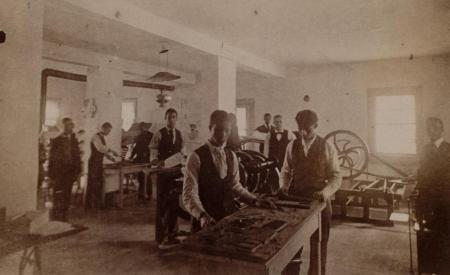
American Antiquarian Society
185 Salisbury Street
Worcester, MA 01609
United States
Led by Lara Langer Cohen and Jordan Stein
How does the study of African American literature change when seen from the perspective of print culture? And how does the study of print culture change when focused on African American archives? In the eighteenth and nineteenth centuries, African Americans participated in a rapidly emergent print culture as authors, editors, printers, readers, teachers, and librarians, among other roles. At the same time, African Americans frequently furnished the subject matter for this print culture, in ways they did not always control. This seminar will explore African Americans' diverse contributions to early American print culture, both on the page and off. It will draw on the American Antiquarian Society's extensive collections of materials related to African Americans, from political newspapers to children's books, from racist broadsides to anti-slavery almanacs, and from city directories to emigrationist tracts. Seminar participants will combine these investigations with readings of recent work bridging critical race studies and material culture. Together we will ask how the methodologies of print culture might help us reconsider familiar notions of authorship and identity, and how African American materials might transfigure conceptual standbys of print culture studies such as circulation and publics.
One goal of the seminar will be to consider how print technologies participated in the formation of racial identity in the United States. To that end, we will examine how a wide variety of printed texts render blackness culturally legible, from visual representations of the distinction between blackness and whiteness to textbooks for freedmen's schools. We will also attend to how representations of race change across printed formats—for example, by tracing Phillis Wheatley's poems as they move from manuscript to broadside to book. Still another goal of the seminar will be to examine the reciprocal effects of racialization on the mediascape of the eighteenth and nineteenth centuries. We will accordingly be concerned with the ways that racialization influences phenomena like the mass production of abolitionist literature, forms of middle-class self-representation such as literary societies, and emerging statistics-based reform efforts. We will pay close attention to the relations between visual and verbal media, asking how these shaped different ideas about race, as well as how they interacted with one another.
A key concern of the seminar will be to interrogate the definition of "African American print culture" itself. In particular, we hope to move this definition beyond authorship to account for the numerous other ways in which African American cultural workers contributed to an expanding print culture, both within African American communities and across the color line.
The seminar will be of interest to graduate students, faculty, and librarians from a range of fields, including African American studies, book history, media studies, English, history, art history, and American studies.
The seminar will be led by Lara Langer Cohen, assistant professor of English at Wayne State University, and Jordan Alexander Stein, assistant professor of English, University of Colorado at Boulder. They are the co-editors of Early African American Print Culture in Theory and Practice, University of Pennsylvania Press (2014).